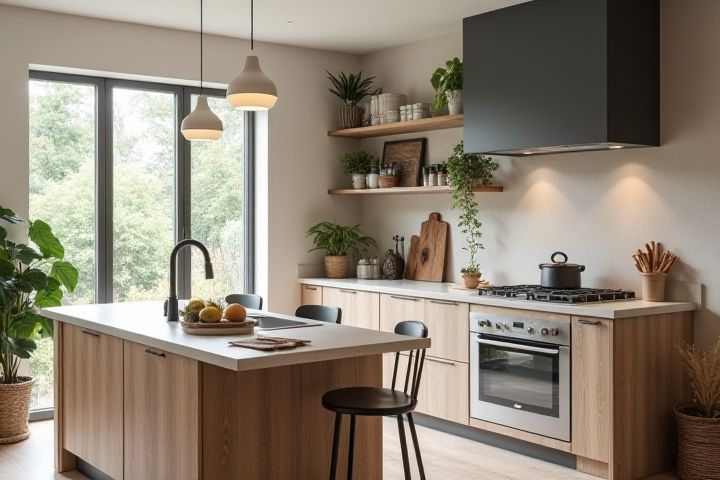
Renovating your kitchen can greatly enhance the functionality and aesthetic appeal of your home. Consider a renovation when your kitchen shows signs of wear, such as outdated appliances, stained countertops, or damaged cabinets, which can diminish your home's value. If you frequently find yourself lacking space for meal preparation or entertaining, expanding or reconfiguring the layout could significantly improve your cooking experience and reduce frustration. Additionally, energy-efficient upgrades, such as installing LED lighting and Energy Star-rated appliances, can lower utility bills and benefit the environment. Finally, if you're preparing to sell your home, a modernized kitchen can attract more buyers and potentially increase the sale price.
When To Renovate A House'S Kitchen
Budget constraints
Renovating your kitchen can significantly increase your home's value, with an average return on investment around 70-80%. A well-planned budget is essential; the typical kitchen remodel costs between $12,000 to $35,000, depending on the scope of changes and materials selected. Prioritize critical updates, such as appliances, cabinetry, and countertops, which can account for 50% or more of your budget. Understanding local market trends can help you allocate funds effectively, ensuring that your renovations attract buyers while staying within your financial limits.
Overall kitchen layout
Renovating your kitchen often begins with a thorough evaluation of the overall kitchen layout, which significantly impacts functionality and efficiency. A well-optimized kitchen layout typically follows one of three common designs: the U-shaped, L-shaped, or galley format, with the work triangle concept guiding the placement of the stove, sink, and refrigerator. If your kitchen layout fails to facilitate seamless movement, consider renovations; a survey found that 60% of homeowners experience workflow issues due to inefficient design. Invest in a layout that caters to your cooking style, enhancing both the aesthetic and practicality of the space.
Appliance age and functionality
If your kitchen appliances are over 10 years old, their efficiency may significantly decline, leading to higher energy bills. Signs of malfunction, such as inconsistent cooking temperatures in ovens or leaking fridges, indicate that it's time for a renovation. Upgrading to Energy Star-rated appliances can reduce energy consumption by 10-50%, providing you with substantial savings over time. Your kitchen should not only look great but also function efficiently, ensuring that cooking remains enjoyable and hassle-free.
Energy efficiency
Consider renovating your kitchen when your energy bills exceed $200 per month, indicating inefficient appliances or insulation. Upgrading to ENERGY STAR-rated appliances can save you up to 30% on energy costs, making it a financially wise choice. If your kitchen is poorly insulated, you might lose as much as 20% of your heating and cooling expenses, suggesting that adding insulation could yield significant savings. Opt for LED lighting, which uses 75% less energy than traditional lighting, enhancing both energy efficiency and long-term cost savings.
Aesthetic appeal and style
Renovating your kitchen can significantly enhance its aesthetic appeal and style, especially if the space is over a decade old and showing signs of wear. Modern kitchen trends, such as open-concept layouts and sleek cabinetry finishes, can add a fresh look that may increase your home's value by up to 20%. Investing in high-quality materials, such as quartz countertops and stainless steel appliances, emphasizes durability while providing a contemporary vibe. If your current kitchen fails to reflect your personal style or meets your cooking needs, it's an indicator that a renovation may be timely and beneficial.
Wear and tear signs
Wear and tear signs in your kitchen can signal it's time for a renovation. Common indicators include scratches on countertops, wear on cabinets, or stained flooring. If your appliances are over 10 years old and frequently malfunction, upgrading them can enhance energy efficiency and functionality. Addressing these issues promptly can not only improve aesthetics but also increase the overall value of your home.
Technology integration
Renovating your kitchen is an ideal opportunity to integrate advanced technology that enhances functionality and energy efficiency. Consider incorporating smart appliances such as Wi-Fi-enabled refrigerators, ovens with programmable features, and dishwashers that optimize water usage. Installing a home automation system can allow you to control lighting and temperature through your smartphone, creating a more convenient cooking environment. Furthermore, integrating voice-activated devices can streamline your kitchen tasks, making it a more efficient space for meal preparation and entertaining.
Plumbing and wiring issues
Renovating your kitchen is essential when you encounter persistent plumbing leaks or corroded pipes, as these issues can lead to larger structural damage and mold growth. Outdated or faulty wiring, often evident through flickering lights or frequent circuit breaker trips, indicates a need for electrical upgrades to ensure safety and functionality. Having a modern plumbing system equipped with high-efficiency fixtures can enhance your kitchen's water usage while reducing utility bills. Addressing these critical concerns not only improves your kitchen's aesthetics but also increases your home's overall value and safety.
Market value impact
Renovating your kitchen can significantly enhance your home's market value, with a typical ROI of 60% to 80% depending on location and market conditions. The ideal time to undertake this renovation is when real estate trends indicate a high demand for updated features, which often peaks in spring and early summer months. Consider the average cost of kitchen renovations, ranging from $15,000 to $50,000, and ensure your upgrades align with the standards of comparable homes in your neighborhood. An appealing kitchen can not only increase your property's value but also attract potential buyers more effectively.
Lifestyle changes or needs
Renovating your kitchen is essential when lifestyle changes, such as a growing family or increased cooking habits, emerge. A modern kitchen remodel can increase home value by up to 15%, making it a worthwhile investment. If your current workspace feels cramped or outdated, upgrading appliances and layout can enhance both functionality and aesthetic appeal. Consider identifying specific needs, like improved storage solutions or energy-efficient appliances, to tailor your renovation for optimal enjoyment and utility.
